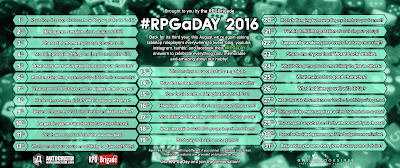A couple of months ago Ray Otus released the Gygax 75 Challenge, a 5-week workbook guiding one through making a small campaign setting based on the advice of an article Gary Gygax published in a zine less than a year after D&D came out.
It looks super fun so I printed it out and bound it with a pamphlet stitch and flipped through and saw a one-line suggestion that it could be a cyberpunk setting instead of standard fantasy. I shared my excitement about this with Sean Smith (creator of such wonders as Quarrel & Fable, Gully-Toads, and Exuviae), who it turns out had -also- decided to do the Gygax 75 with a cyberpunk setting.
WELL
I decided it would be fun to do a setting linked to his. Mine takes place 100 years after a calamity destroys whatever cyberpunk civilization existed, and might even feature the same location as a ruin. Fuck knows if this will actually realize in that way but it's a hell of a good idea to start off running with.
What would the the post-apocalypse be like after a cyberpunk future?
Anyway, Gygax 75 Week 1:
i. "Get/create a notebook." This blog is it! also the simplenote app on my phone. I did consider using a physical notebook and I might do that for maps, but I find it easier to capture ideas in text digitally.
ii. "Develop your pitch." So it's a kind of post-cyber-occult-pocalypse. Here goes:
1. A century ago, the technologic future suffered an occult calamity.
2. Humanity scavenges for survival in the ruins of a cyperpunk dystopia.
3. Electric devil skeletons animated by technocultists lurk in collapsed arcologies and burnt-out server farms.
4. There is a belief that if the dark ritual that caused the calamity can be discovered, it can be reversed. Not everyone wants this.
5. Power sources are valuable because old cyber-tech still exists and can be repaired and run; batteries are sparingly traded for other goods; "if it runs a current it's currency".
6. Forests of broken solar-panel trees snaked through with exposed wires; vast expanses of grey ash made of former office tower blocks.
7. Technoccult magicks are accomplished through rituals that blend blood with computing; sorcery is just another kind of hacking; demons are indistinguishable from rogue AIs.
iii. "Gather your sources of inspiration." Not to be viewed by players, so close your eyes I guess.
1. Mad Max series (George Miller). Post-apocalyptic settings full of freaks in gonzo costumes roaming around a ruined landscape owe much to Mad Max.
2. Dangerous Days (Perturbator). The visual aesthetics of dark synthwave are just right on in general but Dangerous Days in particular--I mean there's one image that literally says "SATAN IS A COMPUTER"
3. Polybius (urban legend). The idea of a satantic mind-control arcade game released as a psychological experiment in portland in the 80s is THE BEST. also other games where demonic forces bleed into the real world like Pony Island and Undertale
4. The neon graveyard (Las Vegas). What would the bright neon cityscape of a cyberpunk dystopia look like post-collapse? I reckon it'd be like the vegas neon graveyard.
5. The Matrix trilogy (the Wachowskis). Specifically the real world outside the matrix with that wild underground city and giant vat-walls full of dreaming battery-humans.
6. Blade Runner (Ridley Scott). What if this society collapsed? Those giant pyramids and video screens, dark and abandoned?
7. the occult origins of personal computing (Al Robertson). This cyberpunk author has spoken on the idea that the pioneers of the internet, virtual reality, and mass technology were inspired by occult and psychedelic movements. Never mind if it's true or not, that idea's cool as hell.
extra credit. "Assemble a mood board" yes good
That'll do for now I think! Maybe a hack of Mutant Future could run this pretty good.

